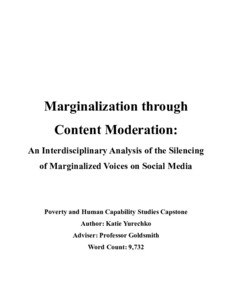| dc.rights.license | In Copyright | en_US |
| dc.creator | Yurechko, Kathryn | |
| dc.date.accessioned | 2023-09-06T11:58:05Z | |
| dc.date.available | 2023-09-06T11:58:05Z | |
| dc.date.created | 2023 | |
| dc.identifier | WLURG038_Yurechko_POV_2023 | |
| dc.identifier.uri | https://dspace.wlu.edu/handle/11021/36231 | |
| dc.description | Capstone; [FULL-TEXT FREELY AVAILABLE ONLINE] | en_US |
| dc.description | Kathryn Yurechko is a member of the Class of 2024 of Washington and Lee University. | en_US |
| dc.description.abstract | Social media is largely considered a democratic space. It seemingly promotes the freedom and equality of all people by enabling individuals to voice their perspectives online, regardless of their identities. However, while many Americans use social media to share their opinions and experiences, algorithms disproportionately remove the content of users who hold marginalized identities without justification. Such unwarranted removals occur through the process of content moderation, whereby social media platforms attempt to rid the digital realm of content that violates their rules, including violent content and harassment. Cloaked in opacity, the silencing of marginalized users via content moderation not only reflects ongoing discrimination against marginalized groups, but it reinscribes systemic prejudices like racism and sexism into the physical world, often without public awareness. Throughout my paper, I attempt to answer the following question: What, if anything, should be done regarding social media content moderation policies and their enforcement to address the problems that they aim to address but without disadvantages for marginalized groups? The threat that unfairness in content moderation poses to marginalized communities makes formulating and pursuing a response to this question into a moral imperative. Considering the silencing of marginalized individuals from a Rawlsian perspective, one understands that behind a veil of ignorance that prevents us from knowing our identity and personal circumstances, we would devise principles of justice that are not biased for or against any specific group. [From Introduction] | en_US |
| dc.format.extent | 29 pages | en_US |
| dc.language.iso | en_US | en_US |
| dc.rights | This material is made available for use in research, teaching, and private study, pursuant to U.S. Copyright law. The user assumes full responsibility for any use of the materials, including but not limited to, infringement of copyright and publication rights of reproduced materials. Any materials used should be fully credited with the source. | en_US |
| dc.rights.uri | http://rightsstatements.org/vocab/InC/1.0/ | en_US |
| dc.subject.other | Washington and Lee University, Shepherd Poverty Program | en_US |
| dc.title | Marginalization through Content Moderation: An Interdisciplinary Analysis of the Silencing of Marginalized Voices on Social Media | en_US |
| dc.type | Text | en_US |
| dcterms.isPartOf | RG38 - Student Papers | en_US |
| dc.rights.holder | Yurechko, Kathryn | |
| dc.subject.fast | Social media | en_US |
| dc.subject.fast | Racism | en_US |
| dc.subject.fast | Sexism | en_US |
| dc.subject.fast | Censorship | en_US |
| local.department | Shepherd Poverty Program | en_US |
| local.scholarshiptype | Capstone | en_US |
